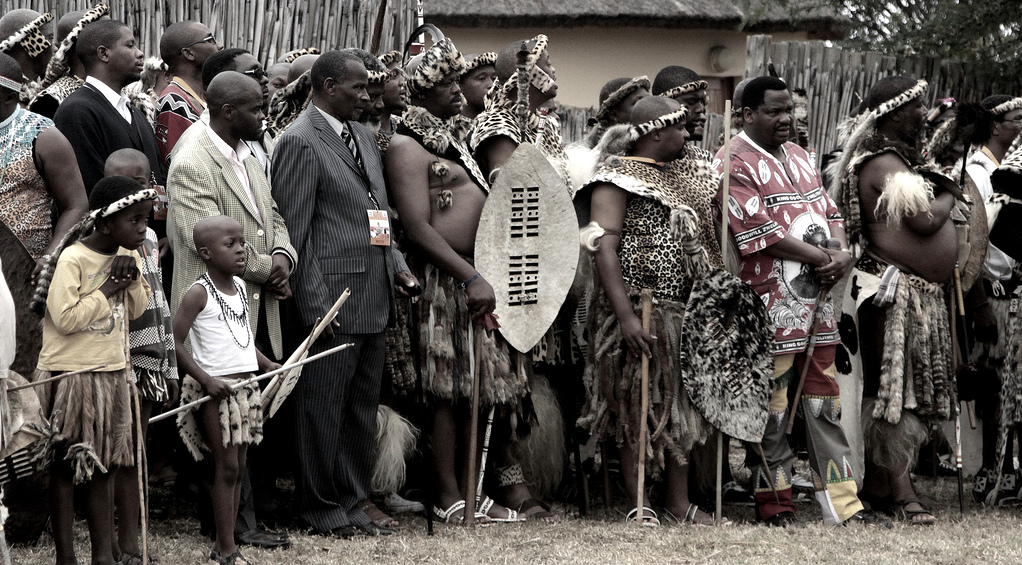Zulu traditional religion holds that Unkulunkulu is the highest God and is the creator of humanity. Unkulunkulu ‘the greatest one’ is said to have been created in ‘Uhlanga’, a huge swamp of reeds, before he came to Earth.
Although Irvin Hexham (1981), holds that “there is no evidence of belief in a heavenly deity or sky-god in Zulu religion before the advent of Europeans,” other scholars including Eileen Jensen Krige render that, the “Lord of Heavenly” or Zulu sky-god has always existed in the traditional Zulu belief system, a deity, who they argue is greater than the “archetypal ancestor and creator, Unkulunkulu.”
The Zulu are also said to be part of the so-called Bantu with the Nguni people being their ancestors. Nguni is said to have led a migration from Egypt to the Great Lakes via the Red Sea corridor and Ethiopia, becoming the new home of the Nguni which is the mystical Embo of Zulu storytellers to the present day.
As historians point out, at this stage in history, there was no central authority clan by the Zulu name among the Nguni people. However, today the Zulu people are the largest ethnic group in South Africa with eight million people with East African origins who over centuries, migrated south during what is called the great Bantu migration sometime after the 2nd century C. E.
Under the leadership of Shaka in the early 19th century, he forged the Zulu kingdom within 10 years expanding frontiers. He chalked major successes while making the Zulu earn a fearsome reputation even till date in South Africa.

By the late 18th century, competition for grazing lands and access to sources of ivory, an important trade commodity, fostered conflict among Nguni clans leading the Zulu to develop a distinct language before a collective identity or a centralized political structure was birthed.
The Zulu name is said to have been derived from one of the clan founders but with Shaka ascending the throne to become clan chief in 1815, the Zulu began a campaign of conquest and expansion known as the ‘mfecane’, “which led to the incorporation of many other peoples. A brilliant military leader, Shaka soon built an army of more than 40,000 rigorously trained soldiers. Shaka also introduced several important military innovations, such as the short stabbing spear, which gave Zulu troops a distinct advantage over their adversaries.”
Owing to Shaka Zulu, Zululand encompassed most of the area now known as Natal Province. “Shaka claimed absolute authority over his kingdom. His hierarchical leadership style was retained by subsequent Zulu rulers and later adopted by Inkatha, a 20th-century Zulu political organization.”
When Shaka’s mother Nandi had taken seed before recognition as the chief’s wife, her protruding stomach was dismissed as affliction by an intestinal beetle known in Zulu medical circles as a ‘shaka’ hence when the future king was birthed in 1787, he was so named. Although being his father’s eldest son, Shaka’s ill-timed arrival denied him heir-apparent status, so he orchestrated the murder of his younger brother and legitimate heir to the Zulu throne, aided by an overlord chief, Dingiswayo.

Despite Shaka’s formidable tactics and successes, he faced internal opposition, and in 1828 his half-brother Dingane assassinated him. “But Dingane lacked Shaka’s military acumen and fared poorly in battles against the expansionist Afrikaners (also known as Boers). Although the Zulu lost land to the Afrikaners during the mid-19th century, they did not fall under European colonial rule until 1883, when Zululand was invaded by British troops. As part of Great Britain’s Natal Colony, Zululand was divided into 13 chiefdoms, and the Zulu king Dinuzulu was exiled. Missionaries encouraged the Zulu to forsake practices of ancestor worship in favor of Christianity.”
The Zulu homeland was called KwaZulu and ruled by nominally independent “tribal” authorities till Mangosutho Gatsha Buthelezi became the chief minister of KwaZulu in 1976.
Using the Inkatha Ya Ka Zulu, a Zulu cultural organization founded in 1928, he began encouraging Zulu nationalism.

Buthelezi, a descendant of the 19th-century Zulu king Cetshwayo, although spoke out against apartheid, seemed to have been more concerned with ethnic separatism- that is the Zulus seceding from the South African state. That view led him to collaborate with the white-ruled South African government leading to clashes with anti-apartheid groups such as the African National Congress (ANC) within the 1980s and early 1990s seeing violent clashes. Jacob Zuma however is from the Zulu stock.
The Zulus have modernized with traditional clothing reserved for special occasions. The Zulu retain strong connections with their ancestral and historical roots. They emerged with the concept of Ubuntu- which states that we are people, not because of our individuality, but by virtue of our connections to other people, thus underlying the importance of relationships.










